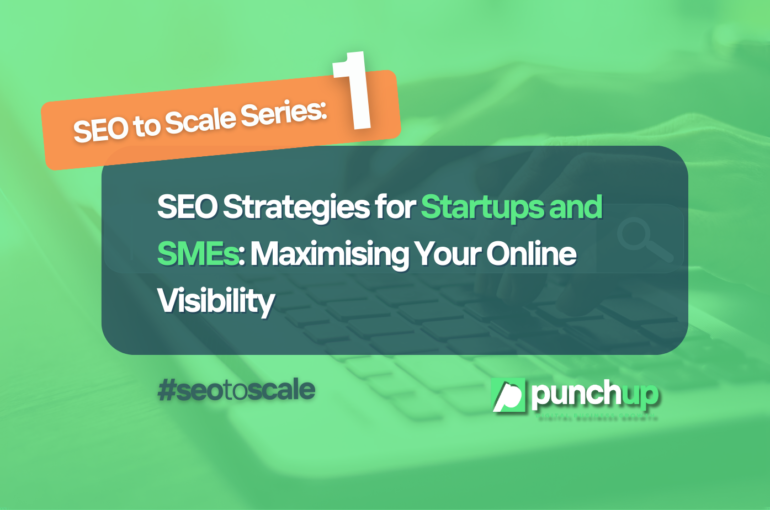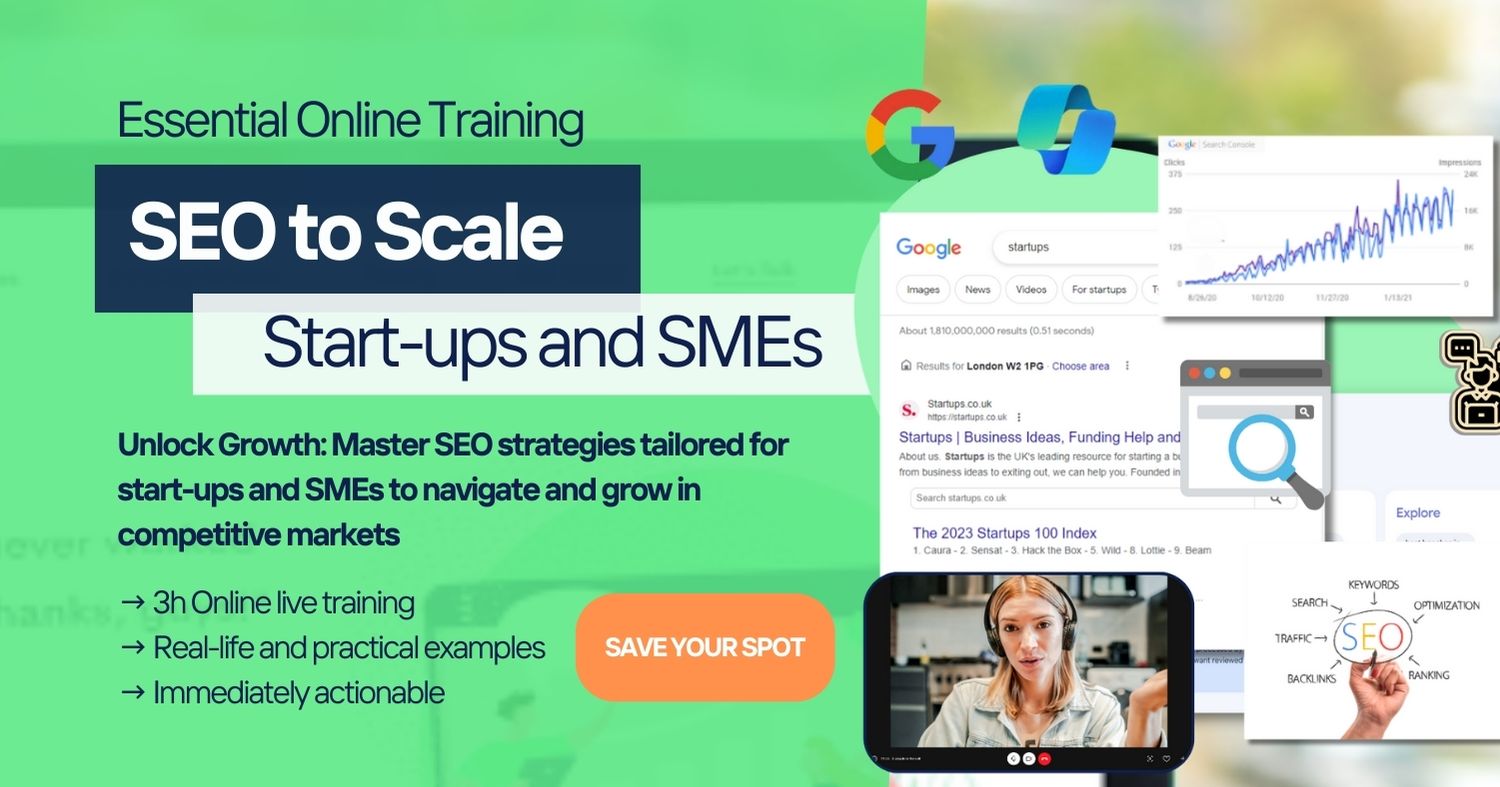[SEO to Scale #1] SEO Strategies for Startups and SMEs: Maximising Your Online Visibility
[SEO to Scale #1] SEO Strategies for Startups and SMEs: Maximising Your Online Visibility

In the digital age, visibility is king. For startups and small to medium enterprises (SMEs), making a mark online can feel like trying to be heard at a rock concert – possible, but you need to hit the right notes! Let’s dive into how SEO can be your backstage pass to online success.
For startups and small to medium-sized enterprises (SMEs), Search Engine Optimisation (SEO) is not just a marketing strategy; it’s a vital tool for survival and growth in the digital landscape. SEO is about more than just ranking on search engines; it’s about being visible to the right audience at the right time.
If this article gets you excited to start, have a look as well at our specialised SEO training for SMEs and Startups. We promise you it will be immediately actionable.
The Digital Stage for Startups and SMEs
In a world where digital presence can make or break a business, startups and SMEs often find themselves competing against industry giants with far larger budgets and resources. However, SEO levels the playing field, allowing smaller businesses to shine through organic search results. By understanding and implementing effective SEO strategies, these nimble entities can outperform larger competitors, capturing the attention of their target audience in a vast online landscape.
Understanding SEO Basics
-
What is SEO?
- SEO, or Search Engine Optimization, is the art and science of making your website more visible to search engines like Google. It’s like aligning your website with the stars of the digital universe, making sure it’s seen by those who are looking for it. It involves tweaking and tuning various aspects of your website and online presence to improve rankings and attract more visitors.
-
Why is SEO Crucial for Your Business?
- In the digital world, if you’re not on page one of Google, you’re like a tree falling in a forest with no one around. Does it make a sound? Who knows! That’s where SEO comes in. It’s not just about being visible; it’s about being visible to the right people at the right time. Good SEO ensures that when potential customers are searching for what you offer, your business appears front and center.

Building a Strong SEO Foundation
A robust SEO strategy starts with a solid foundation. This involves understanding the basics and setting up your website for SEO success.
-
Keyword Research: Begin by identifying the keywords and phrases that your target audience uses to search for your products or services. Tools like Google Keyword Planner and SEMrush can provide valuable insights.
-
On-Page Optimization: Ensure that your website’s pages are optimized for the keywords you want to target. This includes optimizing title tags, meta descriptions, header tags, and the content itself. Remember, each page should focus on a unique primary keyword or topic.
Creating Quality Content That Resonates
Content is the heart of SEO. It’s not just about stuffing keywords; it’s about providing value to your audience.
-
Understanding User Intent: Create content that aligns with what your audience is seeking. Whether they’re looking for information, a specific product, or a service, your content should provide the answers.
-
Content Variety: Diversify your content. Include blog posts, articles, infographics, videos, and more. For example, a how-to guide or a tutorial video can be extremely valuable for users looking for practical advice in your industry.
Leveraging Local SEO for SMEs
For many SMEs, local SEO is a crucial part of their strategy, especially if they have a physical location or a specific service area.
-
Google My Business: Optimize your Google My Business listing. This is crucial for appearing in local search results and Google Maps. Regularly update your business information, including hours, location, and contact details.
-
Local Keywords: Incorporate local keywords into your website’s content. If you’re a bakery in Seattle, make sure terms like “Seattle bakery” or “best bread in Seattle” are part of your content.
Understanding the Power of Backlinks
Backlinks, or links from other websites to yours, are a critical component of SEO. They are like votes of confidence from other sites.
-
Quality Over Quantity: Focus on getting high-quality backlinks from reputable websites in your industry. One good link from a respected source is worth more than ten from lesser-known sites.
-
Guest Blogging and Collaborations: Reach out to industry blogs or websites for guest blogging opportunities. This not only gives you a backlink but also exposes your brand to a wider audience.
Navigating Technical SEO
Technical SEO ensures that your website meets the technical requirements of modern search engines, improving organic rankings.
-
Site Speed and Mobile Optimization: Ensure your website loads quickly and is mobile-friendly. Use Google’s PageSpeed Insights for recommendations on improving site speed.
-
Structured Data and Schema Markup: Use structured data to help search engines understand your website’s content better. Schema markup can enhance your appearance in SERPs with rich snippets.
"Effective SEO is the cornerstone of digital success for startups and SMEs, transforming your website from a hidden gem to a beacon for your target audience."
Measuring SEO Success and Analytics
SEO is not a set-it-and-forget-it strategy. Continuous monitoring and adjustments are key.
-
Tracking Tools: Utilize tools like Google Analytics and Google Search Console to track your website’s performance. Monitor organic traffic, bounce rates, and conversion rates.
-
Regular Audits: Conduct regular SEO audits to identify areas for improvement. This can include checking for broken links, reviewing keyword strategies, and analysing competitor strategies.
Advanced SEO Strategies for Growth
As your business grows, so should your SEO strategies. Incorporate advanced techniques to stay ahead.
-
Voice Search Optimisation: With the rise of voice search, optimise your content for conversational keywords and phrases.
-
Video SEO: Optimise your video content. Include relevant keywords in your video titles, descriptions, and tags. Host videos on platforms like YouTube for additional visibility.
SEO in Action: Real-World Examples
Startup Success Story: Tech Startup Leverages Long-Tail Keywords
A fledgling tech startup specialising in AI-powered project management tools faced the challenge of standing out in a competitive market. Their breakthrough came with a focused SEO strategy centered around long-tail keywords.
-
Keyword Research and Selection: The startup began by conducting thorough keyword research to identify long-tail keywords specific to AI in project management. Tools like SEMrush and Ahrefs helped them pinpoint terms like “AI tools for efficient project management” and “artificial intelligence in project planning.”
-
Content Strategy Development: With a list of targeted long-tail keywords, they developed a content strategy that included blog posts, how-to guides, and case studies revolving around these keywords. For instance, they wrote an in-depth guide on “Integrating AI into Daily Project Management,” which addressed specific queries related to their niche.
-
On-Page Optimization: They ensured that these long-tail keywords were incorporated naturally into their web pages’ titles, meta descriptions, headers, and body content. This approach improved their pages’ relevance to specific, niche search queries.
-
Result Tracking and Adaptation: Over six months, they closely monitored their website’s traffic using Google Analytics and observed a significant 150% increase in organic traffic. The increased traffic also led to higher lead generation, as visitors were specifically interested in AI solutions for project management.
Local Business Triumph: Local Plumber Masters Local SEO
A local plumbing business in a mid-sized city sought to increase its online visibility and attract more customers. Their SEO efforts were strategically focused on local optimization.
-
Google My Business Optimisation: They claimed and optimised their Google My Business (GMB) profile, ensuring all information was accurate and complete, including business hours, contact information, and a detailed description of their services. They also regularly posted updates and photos of their work on their GMB profile.
-
Gathering Reviews: Understanding the power of social proof, they encouraged satisfied customers to leave reviews on their GMB profile. This not only improved their online reputation but also positively impacted their local search rankings.
-
Local Backlink Strategy: They actively sought backlinks from local business directories, community websites, and local news sites. They participated in local community events and charity drives, leading to mentions and links from local media and event organisers’ websites.
-
Content Localisation: On their website, they included content that was relevant to the local community, such as “Emergency Plumbing Services in [City Name]” and “Your Local [City Name] Plumbing Experts.” This content was not only optimised for SEO but also resonated with the local audience.
-
Results: These concerted efforts led to their business appearing in the top 3 results for local plumbing-related searches within their city. This improved ranking translated into a substantial increase in service calls and inquiries, significantly boosting their customer base and revenue.
Staying Agile: Adapting to SEO Changes
SEO is an ever-evolving field. Staying informed about the latest trends and algorithm updates is essential for ongoing success.
-
Continued Learning: Attend webinars, subscribe to SEO blogs, and participate in forums. The SEO landscape changes rapidly, and staying informed is key to adapting your strategies effectively.
-
Testing and Experimentation: Don’t be afraid to try new things. SEO is as much an art as it is a science. Regularly test different strategies to see what works best for your business.
Conclusion
SEO for startups and SMEs is about more than just chasing rankings; it’s about building a sustainable online presence that resonates with your target audience. It requires a combination of technical know-how, content excellence, and a keen understanding of your audience’s needs. By committing to a comprehensive, dynamic SEO strategy, startups and SMEs can not only improve their online visibility but also lay the foundation for long-term digital success.
Remember, Rome wasn’t built in a day, and neither is SEO success. Patience and consistency are key. And if all else fails, remember that at least you’re not trying to rank for “Google” on Google!
If you want to learn how to implement all of this and much more, have a look our specialised SEO training for all Marketers and Business Managers for Startups and SMEs




